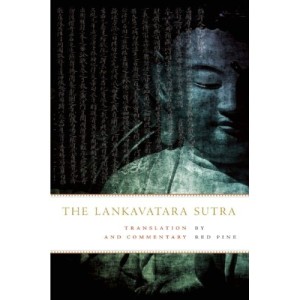I can remember on a warm day this past August being excited after pre-ordering a copy of Red Pine’s (Bill Porter) newly translated edition of the Lankavatara Sutra.
This was long in the making as he had been working on this translation for many years and so there has been eager anticipation as to its release. Originally, the publication date was set for late February, 2012. About a month ago I received an alert from Amazon that it would now be available by the end of January; then a few days ago another notice indicating that it would be shipping soon and one today notifying that it has been shipped and would arrive at my residence in a few days.
Red Pine has translated editions of the Diamond, Heart, and Platform Sutras as well as The Zen Teaching of Bodhidharma and his masterful scholarship and running commentaries have always been a joy to read. Apparently, his Lanka translation is from the original text purportedly used by Bodhidharma and is an edition that Chinese Zen masters have consistently relied upon. Since the main English editions available have been exclusively by Suzuki since the 1930’s it will be refreshing to read Bill Porter’s take on the text. Many of us Lankavatarians have never been satisfied with Suzuki’s translation; for instance, his choice of words for pavavriti—or the “turn about” within the deepest recesses of consciousness—is “revulsion”—yuk! What a poor choice of words, bringing to mind something “revolting” and “disgusting”, when the “turn-about” really signifies something wonderfully happening—an actual process of “reversal” wherein the Self actually turns and Recollects IT’s very vivifying Primordial Stature. There will be those who could argue the point that Suzuki was referring to what one is turning about from, i.e., phenomena, and thus one has a sense of revulsion with the phenomenal; yet, the emphasis of pavavriti within the Lanka is on this “process of reversal”–in essence remaining prior-to all phenomena–rather than giving the phenomenal such undue focus.
Am looking forward to posting my reviews on this new translation after reading and reflecting upon the text; I’m hopeful that this new translation of the revered Lankavatara Sutra will prove to be the definitive edition for all earnest students of the Buddhadharma.


Interestingly enough, when Azanshi first pointed me to the Unborn School of Zen and you, it was by mentioning you in relation to the new Lankavatara translation … that’s when I first learned about it. I’m pre-ordering it, too. What perfect timing! Just when I decided to study it again, slowly; and what a good companion it will be, to my planned solitude.
Can’t wait to see the differences with DT Suzuki’s translation and the choices Red Pine made. Will keep a close eye on your valuable reviews since I know you know your Lanka inside-out in word and spirit.
It seems that some advanced text was released…here is an example comparing Red Pine with Suzuki:
Red pine wrote: Mahamati, words are not ultimate truth, nor is what they express ultimate truth. And how so? Ultimate truth is what buddhas delight in. And what words lead to is ultimate truth. But words are not ultimate truth. Ultimate truth is what is attained by the personal realization of buddha knowledge
Suzuki wrote: Mahamati, words are not the highest reality, nor is what is expressed in words the highest reality. Why? Because the highest reality is an exalted state of bliss, and as it cannot be entered into by mere statements regarding it, words are not the highest reality. Mahamati, the highest reality is to be attained by the inner realisation of noble wisdom;
Actually, I prefer Suzuki here–especially with “the inner realization of noble wisdom” vs Red Pine’s “personal revelation of buddha knowledge.” Personal revelation? Oh, boy!
The commentators state that:
“That’s because Red Pine is translating for the general reader, not for the critical scholar or technical practitioner. There is absolutely nothing wrong with that as long as the reader understands when they read Red Pine they are getting it presented in the way that Red Pine honestly feels will be best understood by the most people, not in a way that nit-picks over the technical Buddhist terms.”
Hence, Red Pine is taking a reductionist approach for the benefit of general readership.
Well, being more of the “practitioner” mindset, I sense that this could prove to be a disappointment; however, a reductionist rendition will be more inviting for the uninitiated, so it should be very interesting. 🙂
Found this at the following forum:
http://www.zenforuminternational.org/viewtopic.php?f=17&t=7518
Another comment from that forum:
“The terms “buddha knowledge” and “noble wisdom” are translations of aryajnana (C. 聖智). Obviously, Red Pine is inserting the word “buddha” to help the reader know that the noble-knowledge being spoken of is the noble-knowledge of a Buddha. But by leaving out the word “arya” that means “noble, honorable, highly esteemed, excellent, worthy one,” etc., and inserting “buddha,” Red Pine is going further than I like in translation. The text has arya-jnana not buddha-jnana, so I feel obligated to translate it that way and not change arya-jnana to read buddha-jnana.”
This will be problematic for those who adhere to the notion that the Buddha was addressing this sutra primarily to the Ariyasavaka, or those noble “hearers” of the Buddhadharma, rather than, through this reductionist revision, addressing the Puthujjana, or those not well schooled in Noble Wisdom.
Based on two book recommendations on The Zennist, I was not disappointed. These were ‘The Zen Teaching of Huang PO – On the Transmission of Mind’ translated by John Blofeld and ‘The Zen Teaching of BODHIDHARMA’ translated by Red Pine. I have just placed my order for the Lankavatara Sutra by Red Pine and look forward to reading that translation. I will be re-reading the Lankavatara Sutra translation by Suzuki and Goddard which I had previously downloaded from the Zennist blog. Look forward to your forthcoming commentary.
Much thanks – Suki